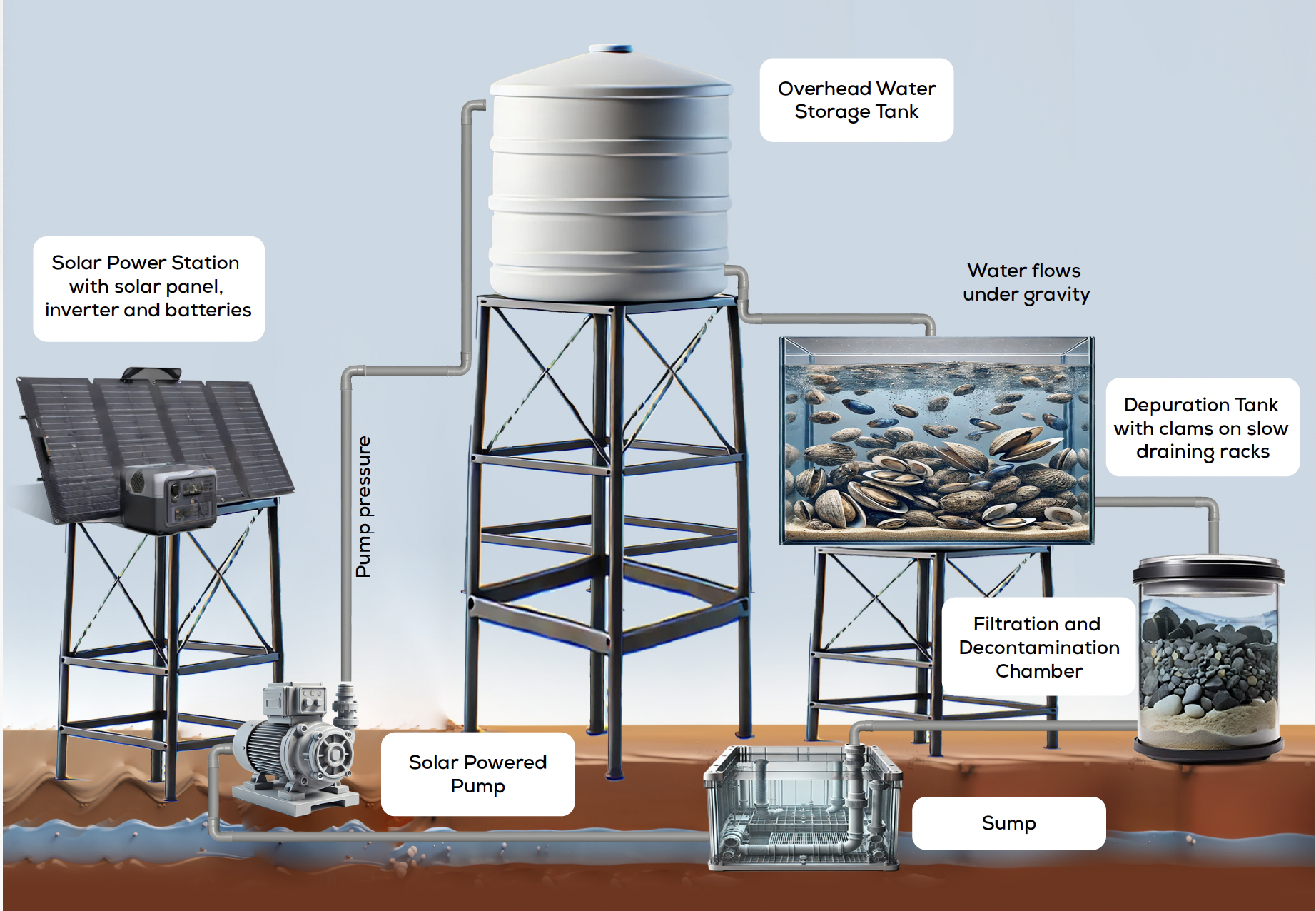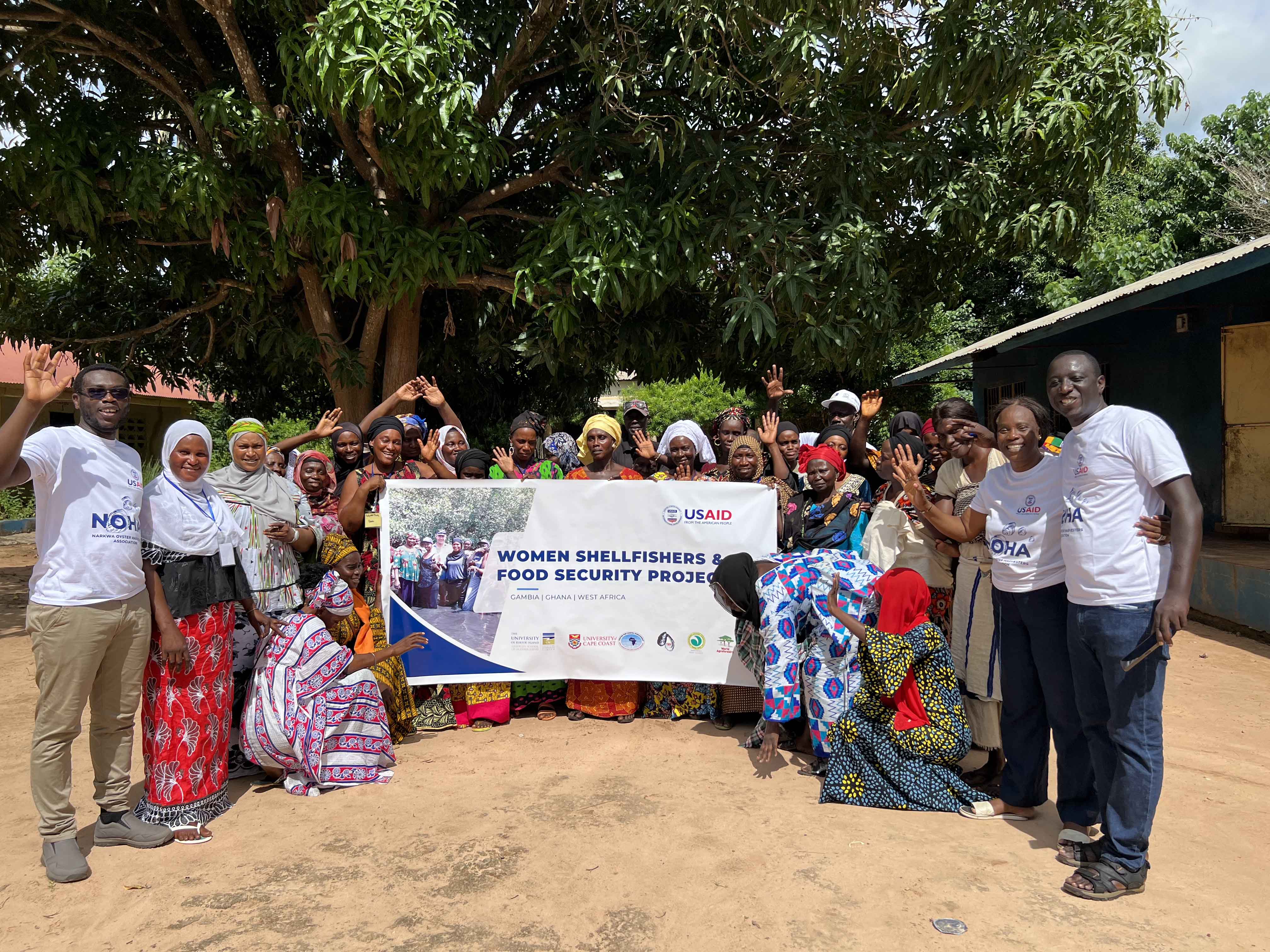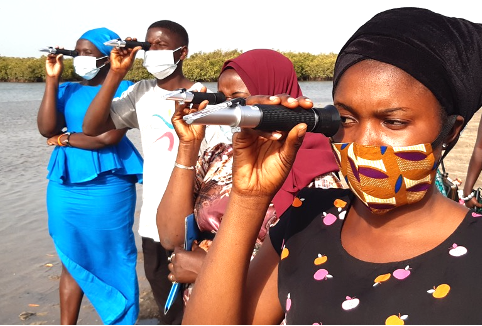Home
About Us
Knowledge
Shellfish Network
Shellfisher Associations
Projects
Conversation
News & Stories
Let Us Know
Support Us
Country
Profiles
Country
Networks
Country
Associations
Projects
Active Projects
Construction and Installation of a Depuration System for the Volta Clam Fishery
Hεn Mpoano, in partnership with the Environmental Justice Foundation and CEWEFIA, is implementing a 3-year Sustainable Ocean Project (SOP) funded by the Norwegian Agency for Development Cooperation (NORAD). The project aims to build grassroots capacity for a sustainable ocean economy in Ghana through inclusive, strong and effective capacity building, planning and management of coastal ecosystems. As part of this endeavor, a depuration system will be designed and installed at Kpomkpo in the Ada East District. The purpose of the depuration system is to address the issues of clam contamination due to human activities on the Volta River catchment which result in pollution and related contamination of clams.
The Shellfish Hub (The Contractor) has been contracted to facilitate the piloting of a recirculatory depuration system under the following terms:
The Contractor agrees to construct and install a depuration system for the Volta clam fishery; in one of the project’s sites located at Komkpo in the Ada East District. The Contractor shall perform the underlisted specific tasks;
• Consultations - the Contractor shall undertake consultations to gather stakeholder inputs into the design and siting of the depuration system and to assure the delivery of a system that is economically viable, socio-culturally acceptable, and fit for purpose. Key stakeholders to be consulted shall include but not limited to; members of the Volta clam fisheries co-management committee (end users), Regional FC Director (Greater Accra), Ada East District Assembly Coordinating Director/ DCE, Hen Mpoano, Environmental Justice Foundation (EjF) – Cape Coast.
• Design and planning of the depuration system – the Contractor shall conduct site inspection, assessment and selection, design the system, install filtration and control systems for monitoring water quality and development of operational systems for standardized procedures such as loading and unloading, cleaning and maintenance.
• Procurement of materials and equipment – the Contractor shall take into consideration, factors including quality, affordability, local availability of materials and equipment to be used for the depuration system. The Contractor shall among others, check for the durability and resistance of materials to corrosion.
• Construction, installation and testing - the Contractor shall prepare the site for installation in consultation with the Volta Clam Fisheries Co-management committee members and shall install the filtration, water circulation and associated equipment and conduct a full system run to verify that all components are working correctly and the system meets operational standards.

- Funding
- $15,700.00
- Duration
- December 04 2024 - May 04 2025
Women Shellfishers and Food Security Project (Phase II)
The Women Shellfishers and Food Security project aims to strengthen the evidence base, increase awareness, and equip stakeholders to adapt and apply successful approaches to rights-based, ecosystem-based, participatory co-management of shellfisheries by women in mangrove ecosystems in West Africa. Over two years (2020-2022) in Phase I, the project:
Conducted the first-ever participatory regional assessment of women-led shellfisheries in the 11 coastal West African countries from Nigeria to Senegal available at https://pdf.usaid.gov/pdf_docs/PA00Z67C.pdf.
Published six technical studies of site-based research in Ghana and The Gambia that tested Theory of Change linkages between women’s shellfish co-management and livelihoods, mangrove conservation, and nutrition.
Fostered a community of practice around the development and dissemination of a toolkit on women’s shellfisheries co-management in West Africa available at https://pdf.usaid.gov/pdf_docs/PA00ZHT6.pdf. See Annex J for 11 individual country assessments and the technical studies.
Over a three-year Phase II (2022-2025), the project will build on these results to:
Demonstrate the biodiversity and socio-economic value of more fully integrated rights-based co-management of linked shellfish - mangrove - proximate landscape food ecosystems in site-based research in Ghana and The Gambia through activities in:
Women shellfishers empowerment
Gender-sensitive shellfishery co-management
Mangrove co-management
Integration of Adjacent landscape food production systems
Establish a functional West Africa Shellfish Knowledge and Outreach Hub engaging and serving stakeholders in the sub-region.

- Funding
- $1,900,000.00
- Duration
- October 01 2024 - September 30 2025
Women Shellfishers and Food Security Project (Phase I)
The Women Shellfishers and Food Security Project is a co-creation of the University of Rhode Island and partners from West Africa – the University of Cape Coast in Ghana, the University of Ghana, TRY Oyster Women’s Association in The Gambia, and World Agroforestry with the United Staes Agency for International Development. This project seeks to address the need for greater attention to food security for women shellfishers and their families while improving biodiversity conservation of the ecosystems on which their livelihoods depend. More robust models, tools, approaches, and processes are needed to enable and promote these sustainable food systems and natural resource management in coastal West Africa. The project will strengthen the evidence base, increase awareness, and equip stakeholders to adapt and apply successful approaches in areas of high potential for replication and scale-up in the eleven coastal West African countries from Senegal to Nigeria. It will draw on successful cases of a rights-based, ecosystem-based, participatory co-management approach to shellfish management by women in mangrove ecosystems in The Gambia and Ghana developed with USAID assistance. Knowledge and experience generated through the project will open up opportunities for improvement and broader application of these promising approaches in West Africa through these key project components:
Conduct the first-ever participatory regional assessment of the situation, unmet needs, and promising approaches to shellfish co-management led by women across the eleven countries and the scope and scale of the potential sectoral and cross-sectoral benefits.
Elaborate and test elements of models based on existing approaches through site-based research in The Gambia and Ghana to strengthen the evidence base for successful elements of the model. The project will conduct six technical studies covering the field research to document linkages in a Theory of Change and conceptual results chain between women’s shellfish co-management and livelihoods, mangrove conservation, and nutrition. It will examine existing elements in the approach that are not well documented, and that could enhance the approach if they are better understood. It will document both sectoral and cross-sectoral findings.
Foster a community of practice around the development and dissemination of a toolkit on a rights-based, ecosystem-based, participatory co-management of shellfish by women in mangrove ecosystems in West Africa with and for community, national, and regional level stakeholders. The toolkit will integrate findings from the participatory regional assessment and site-based research. Building on these activities, the toolkit development and dissemination will build a community of practice and provide capacity development support of 37 stakeholder institutions in West Africa. It will provide the first practical guide for the design and implementation of women’s shellfish co-management in West Africa, supported by a network of practice, among other elements such as policy briefs and case studies.

- Funding
- $1,291,101.00
- Duration
- October 01 2020 - September 30 2022
Inactive Projects
